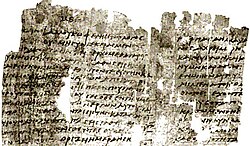|
Hebrews 4
Hebrews 4 is the fourth chapter of the Epistle to the Hebrews in the New Testament of the Christian Bible. The author is anonymous, although the internal reference to "our brother Timothy" (Hebrews 13:23) causes a traditional attribution to Paul, but this attribution has been disputed since the second century and there is no decisive evidence for the authorship.[1][2] This chapter contains an admonition to press on toward 'God's Rest' and a reflection on the power of God's Word.[3][4] TextThe original text was written in Koine Greek. This chapter is divided into 16 verses. Textual witnessesSome early manuscripts containing the text of this chapter are:
Old Testament references
A call to faithfulness (3:7–4:13)Verse 7
The Hebrew version of Psalm 95 names no author, but David is explicitly said to have written these words from Psalm 95:7–8, which happened long after the Israelites already enjoyed rest and were established in Canaan under the leadership of Joshua.[8] Therefore, this day ("Today") is another day in the future for God's people to enter a heavenly rest, beyond the enjoyment of life in the land of Israel.[9] Verse 8
The "rest" experienced by the Israelites in the time of Joshua was 'an earthly anticipation of the ultimate, heavenly rest', an old covenant promise which is fulfilled in a transformed way by Jesus Christ.[9] Verses 11-13
Verses 12-13 contain a warning demonstrating "the necessity for compliance with this exhortation":[12]
Many church fathers and later theologians have identified "the word of God" with the Son of God. Protestant theologian Heinrich Meyer notes that in Hebrews 1:2 there is confirmation that "in these last days [God] has spoken to us by his Son",[15] but argues that the present wording cannot be read in this way because when Hebrews was written, "the expression was too unusual for it to be employed and understood [in this way] without further indication". In his opinion it therefore must have a more broader meaning, quite generally: "that which God speaks".[12] The compassion of Christ (4:14–5:10)The characteristic term of this section is 'High Priest', which links to the beginning of the previous section (3:1; cf. 2:17) as an introduction to the new segment.[9] Verse 15
See also
References
Sources
External links
|
||||||||||||||
